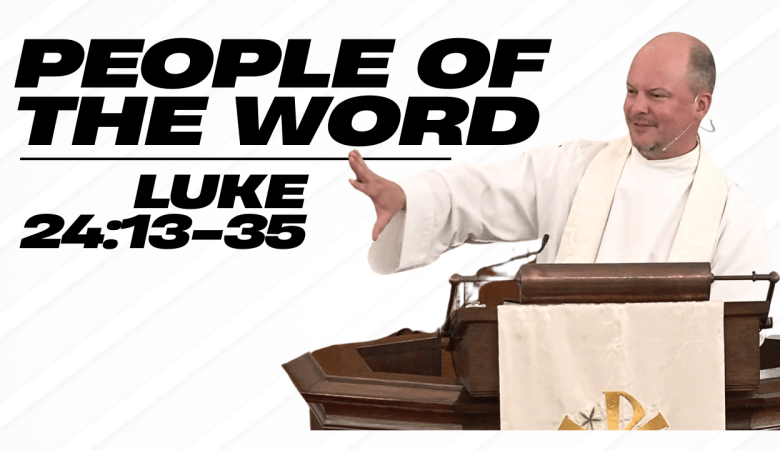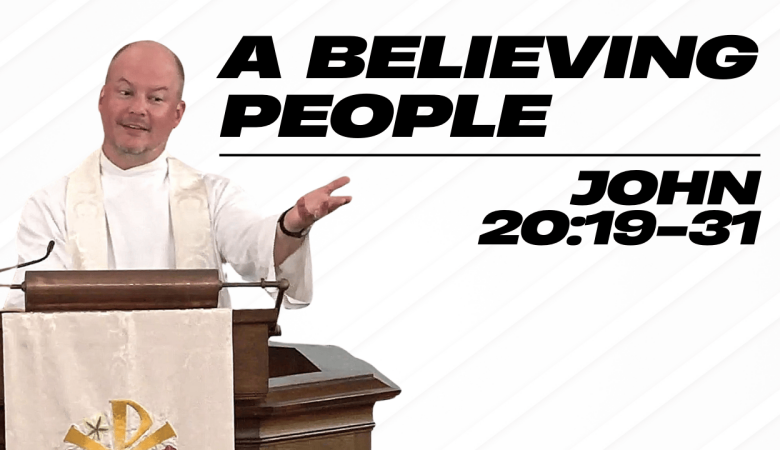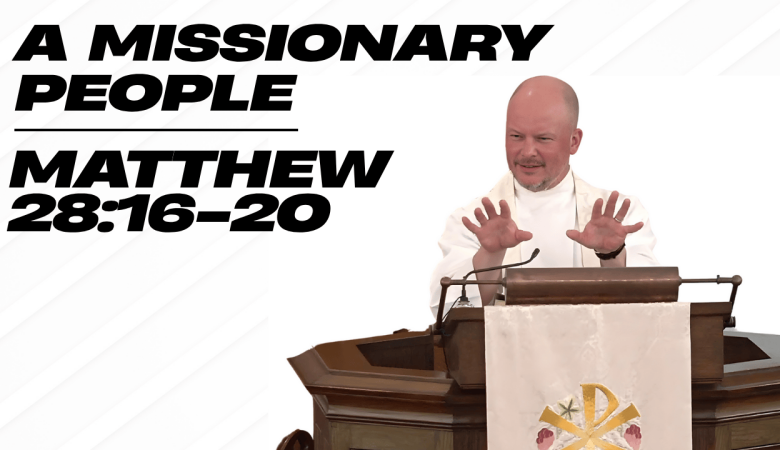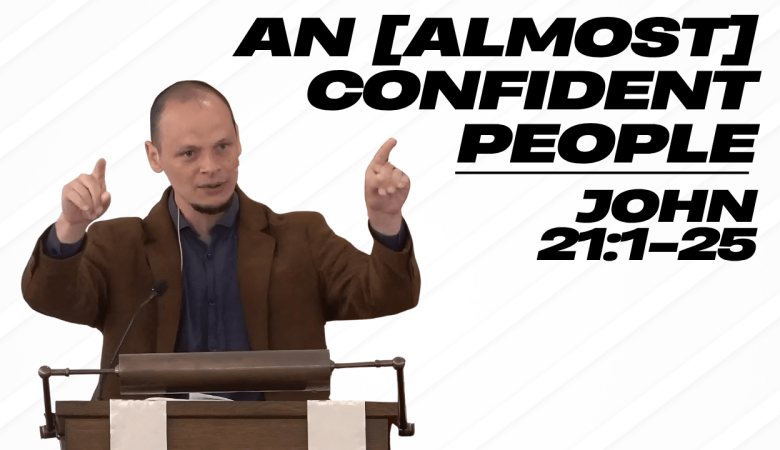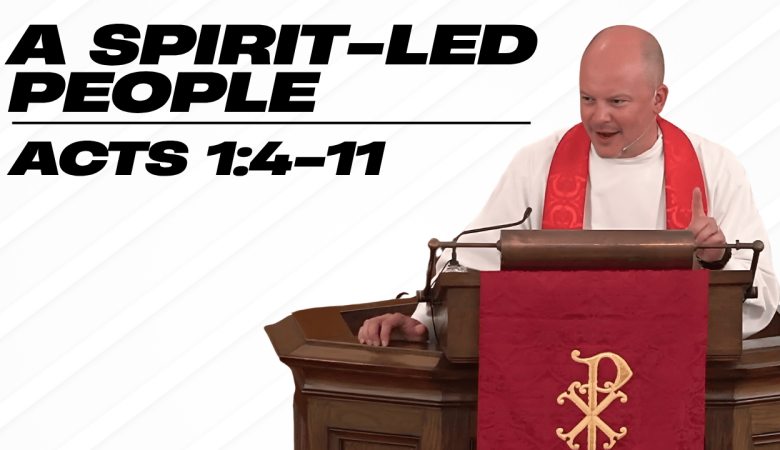Series: Resurrection Narratives
A (Re)Storied People
May 18, 2025 | Peter Rowan
Passage: John 21:1-25
Summary
Being a community of the resurrection, means that we are a (re)storied people because of the restoring work of Christ in the cross and resurrection. We see in John 21 that Jesus invites us into an honest assessment of our past - our shame, sin and family stories - a present participation in his healing work, and then a life and death like his. We are taken, healed and then made to be a cruciform and therefore Christ-like people.
Transcript
Lord, thank you for this beautiful passage at the end of John, and thank you for your interaction with your disciples and thank you for how you are teaching us even this morning through that God, I pray that you would do that. You'd use me, Lord, stumbling as I so often do, Lord, use me. For the blessing of our congregation, that we would be drawn more and more into the life of Christ and reflect more and more the beauty of. Of the good news of what you've done in Jesus. In his name we pray.
Amen.
Again, I want to say good morning and that it's good to be with you. We, Meleise and I, were away last week at a good friend's wedding in Kentucky, and we both remarked to each other how much we love being in the house of the Lord. We did actually get to watch with you last week as we were making our way home. And I know Jonathan mentioned this last week, but I'll just reiterate. I'm really grateful particularly to Tim, but to others of you who make sound and video and stuff like that happen here.
I think sometimes those are overlooked roles, but they're very important, and I know many others are grateful for them. I hope you, if you were not here last week, I hope you heard Jed's sermon. Jed, thank you for your sermon. It was insightful. It was sometimes very funny.
I particularly liked Juliana's response to the question, good job at the beginning of the sermon. And if you actually have not heard it, you can find that on our podcast. You can watch it on YouTube. I really, honestly, you should check it out. It was a blessing.
Anyway, this Easter tide, apart from our Mother's Day sermon, little deviation from our series, what we're doing is we're looking at some of the narratives of Jesus with his disciples after the resurrection. And what I am hoping that we're doing together is we're saying, what does it mean to be a people who live in light of the resurrected Christ, what God has done and conquering Satan, sin and death through the resurrection. And so we saw in Luke 24 a few weeks ago that we're people of the Word. We receive the questioning words of God primarily to us.
I mentioned how often it is that God questions us in the Scriptures. We often approach God like we're the ones, they're putting him on the dock, but actually he's the one that is questioning us. So often we receive the given word of Scripture and the broken word of his body. And what we saw actually in this is that in these acts of receiving the Word. The Lord actually changes our hope, right?
And he takes our. Sorry. He changes our despair and brings us hope. Then we saw in John chapter 20 that the resurrected Christ meets his disciples in the room that is twice said to be locked. They were full of fear.
And, you know, and then we have the doubting that's taking place, and Jesus meets them in their fear and their doubt, and he actually restores them and gives them beliefs, and he transforms this community. And that's what we're hoping for ourselves.
Okay, so today we have a really long passage. Thankfully, Gordon did a dramatic reading of it, in a way, and it kept you engaged. But it's a long passage. It's all the chapter. And you have probably heard sermons from different snippets of this chapter because they warrant their own sermon. But we're going to be taking it all together. And what I am hoping that you see is that in light of the cross and the resurrection, we are a restoried people. The stories we tell about ourselves and the stories that are rightly told of us are actually changed in light of the resurrection because we are restored people in light of what God has done in Christ.
Okay, before we get into that, I want to tell you, I want to actually read to you a little bit of a book that Lillian James and I have been reading. Some of you are familiar, maybe with Andrew Peterson's books, the Wing Feather Saga. It would take too long for me to give you all of the detail that would make this quote better. I'm just going to read it to you. As you might imagine, though, this story is like lots of epic stories, which means that it has love and betrayal and envy and all the things that make up real human life.
Hurt. Vying for attention from others. Putting others down. Putting yourself first. These kinds of things. Shame and guilt. Hurt.
So here is part of the book. North or be Eaten. So tell us the story, lad, said Podo. It's the grandfather figure. What happened? All eyes turned to Janner. He knew this was coming. He'd always loved Podo's stories and dreamed of the day he would have his own.
But now that he had a story to tell, he found the telling was difficult. So much had happened. How could he tell it all? He was afraid to relive parts of it and was ashamed of others. Podo nodded to him.
I know it's hard, lad, but it's yours. You'll find healing in it, like it or not. Start at the beginning, at Ranchi's place. What happened after I broke down the door. Janner took a deep breath and began.
He told them all of it. He told them about his anger at Tink, that's his brother. About the horrors of Tilling Court, about the awful darkness of the Overseer's box and the peace he found there. He told them about Sarah Cobbler and Nurbog and Marley. They listened with wide eyes.
They asked him questions now and then, and more than once. Nia. That's his mother. Nia's eyes were brimming with tears. But what Podo had said was true. Telling the story hurt and helped all at once. Already he could see ways the story had changed him and would go on changing him.
Did you hear that? Telling the story hurt and helped all at once. My guess is you've had some of those experiences in your life. That's what we find in part here in John chapter 21. A restoried people, because they have actually been restored in what God has done in Christ. And because they've been restored in Christ, they're actually willing to enter into the hurt and enter into the help. And good stories, they have a few traits.
Good stories are honest stories, and they tell a history. They tell of the past in an honest way. Good stories engage with the present, and good stories actually begin to shape the future. Okay, so that's sort of going to be our outline here. First, the honest past.
Again, please keep your Bible open. John, chapter 21. Throughout this chapter, there's a lot of echoes. The Bible does this quite a bit. That's actually part of what we're looking at in our Sunday school. How does the New Testament echo? Reuse the Old Testament? But there's a lot of echoes. And some of them are really loud and some of them are quieter about the past of the disciples, and particularly the past of Peter, the disciple Peter. So I want us to look at a few of them.
And the first echo of the past is about fishing. Okay, so our chapter, it begins with listing some of the disciples and that they're there by the Sea of Tiberius. Jesus is revealing himself to some of his disciples. And Peter says, and again, Gordon, read this pretty well. I'm going fishing.
Okay. Which seems actually rather consistent with Peter's past. He's bold, he's a leader. He's sort of brash. He's in the moment, living. I'm going fishing. And everybody else goes, yeah, yeah, okay, we'll go with you. And here's what I want you to remember, is that right there, you're actually supposed to be thinking back on the Very beginning of these disciples call and ministry to Jesus right from the very beginning of the Gospels, these were fishermen. Most of them were fishermen. At least Peter and James and John, the sons of Zebedee, were fishermen.
You might remember, actually this winter we looked at the story of when Peter and James and John, the sons of Zebedee, were called by our Lord to follow him. And specifically, what we learned from that is that this isn't just a hobby thing, like, hey, let's go catch some fish because it's fun to do. This is their profession. This is what they did for their living. And in fact, one of the things that we noted earlier on in the year was that the sons of Zebedee would have meant like, you know, they left their father, it said, in the boat.
Which likely means that it wasn't just kind of, you know, their thing. It was their family thing and their dad's thing and their grandpa's thing. And this was. This was who they were. So it's a lot of their identity.
But here in this story, they are not fishermen. They're failed fishermen. They're failed fishermen. Some of you know how depressing it can be when you go out fishing and somebody says, hey, did you catch any fish? Like Jesus does here in verse five, and you say, as Gordon said, no.
That's a great way of saying it. You said it, you captured it perfectly. Well, if you were a professional fisherman and your father was, and your grandfather was, and so on, then I will tell you this, your failure hurts all the more. Shame. No wonder they actually just say one word. Let's not talk about it, because that is what we do with shame. I don't want to talk about it. No.
Okay. The second echo that we have is not the echo of fishing and their fishermen and their names, which evoke us back to when Jesus first called him to himself. But actually we have this little detail. It's maybe a quiet echo, but in the context, it's a loud echo of the charcoal fire. I love this detail because some of you know that I am adamant that charcoal is much better than gas. And I will go to my deathbed with that conviction.
And as a little plug, you should come to the picnic today. Charcoal. But I will tell you this. There are few things better than fresh caught fish over a live fire. It's a beautiful little detail that we are given.
But as wonderful as these sort of sensual details are that evoke in us memories and delight, it was actually the exact opposite that was taking place there for Peter. This was not A fond memory what had just taken place. Actually, this one word, anthracia, is used two times in the New Testament. Once right here. The other time just three chapters earlier.
Just three chapters earlier there, though Peter had said he would never deny Jesus there, right next to the charcoal fire in the courtyard of the high priest Jesus, Peter denies him three times, which is to say that the shame of not catching any fish is augmented by the sin of the rejection of God, which is what sin is rejecting, denying who God is, what he's done.
Let me give you a third echo. If you look down at verse 15, if you look down in that paragraph, what you'll notice is that three times Jesus addresses Simon Peter. And he addresses him not as Simon Peter, but look at this, okay, verse 15, Simon son of John. Verse 16, he said to him a second time, simon son of John. And then actually verse 17, Simon son of John.
Okay, small little detail, but if you remember when Peter was called to be a disciple of Jesus, when he was, you know, first called, he was fishing there and Jesus says, come and I'll make you fisher of men. What, What Jesus said was, your. That's not going to be your name anymore. Your name is going to be Cephas. And then actually the gospel writer says, which means Peter, which means rock. That was at the very beginning of the story, the very beginning of the gospel. And it's Jesus that says, this is what you're supposed to be called. But here, Jesus three times says Simon, son of John.
By the way, actually, this is kind of interesting too. This is the only other time. Sorry, the only other time that he has said Simon son of John is when he was first called by Peter and when his name was changed. That was when his dad was mentioned. And now his dad is mentioned three times in this story. He calls him his old, old name, but he also names his dad along with him.
If you look at the life of Peter and even the echoes that we had already seen here in the fishing failure and the sin of denying Jesus, one of the things that we actually see is that Peter rarely is a rock like kind of figure. He's actually much more sand, like, you know, kind of wishy and washy and kind of being pushed here and pushed there. Bold at one time and cowardly at another. It's not hard to wonder why Jesus might have mentioned his dad three times. He's kind of evoking his family story and actually inviting him to look back on his own. Right.
I'm sure you know this. Your parents and your primary caregiver shape you more than anything, any person on this earth. The way your parents care for you or do not, or the ways they love you or they don't, or the ways they hold you or do not hold you shapes you more than anything. Humanly speaking. Your father and your mother are the beginning of your story.
Of course, we are not actually told much about Peter's dead. But how odd is it that Jesus doesn't refer to Peter by the name that he says he's going to be referred to, and he met three times here, mentions his dad. We don't know much about this, John, but we do know that this is true, that Jesus and the Lord has made the world in this way that our primary caregivers shape us. And he's inviting him into this kind of thing.
Okay, here's what I'm saying. As Jesus restories our lives around his resurrection. You have to be honest with your past, which is in. There's three things here. You have to be honest with the shame of your past, the failures. You have to be honest with the sin of your past. You just have to be honest with your stories, your family stories, your life stories, the ways that you actually don't live into, the names that you're given or the ways that other people have treated you. This is part of being honest with your past before the Lord.
Think of this, okay? Truly, Jesus invites them to consider this in the very places where actually it might hurt most to consider this, right? Think about this, okay? He's inviting them to consider their shame in the very place where they're most proficient, which is where we feel the most shame, right? Like I said, these people are fishermen. They knew far more than I do how to catch a fish, which isn't too hard. But they're the most adept, they're the most practiced. This is what they do. If there is one place where they didn't want to feel failure, it's the thing that they had done 10,000 hours of right. Become a master of.
Think of how much our life is bound up in our professions and our career, or how many hours we spend practicing those things. Is it any wonder, as sad as it sometimes is, that when we are asked, what do you do? We don't say things like, I go to senators games. I paint. I use charcoal to smoke my pork butts. I play pickleball. No, nobody's saying, what do you do? I write poetry. I'm an engineer. I'm a teacher. I'm a pastor in some ways, because that's what we devote our lives to so much. That's where we find this kind of I do I identity. And that's where we feel the most shame when we are failures at it. Our life is bound up in the time that we spend in these things, our parenting and all the rest. And we feel the most shame in those places.
What is the place of great, greatest sin? For Peter, no doubt for him, it was his threefold denial on the very night of our Lord's death, right? That is the sin that I guarantee loomed large in his heart. And Jesus calls him out on that with some of the details that would have brought up, that would have evoked in him the very place, the very moment, the very person, where he said, I do not know the man.
We just say, you cannot find resurrection healing without looking at the things of your past that you would most like to hide, to just forget. And of course, while we don't know the relationships that Peter had with his dad, we do know that our own relationships with our parents shape us into rocks or sand, rocks that can withstand much that the world throws at us or simply sifting from one thing to the next. They're some of the most formative interactions of our lives, which is also why we are so reticent to engage with them.
What I'm saying is that even in this story, I know we could have taken apart these different. We could have had much shorter sermons here. But if you take them all together, what Jesus is inviting us to do is an honest appraisal of our past. And he's saying, you cannot be a restorated. You cannot be a restored person without being an honest person.
Okay? An honest past. The next thing I want to say is a participatory present, okay? Jesus restories Peter and these other disciples by being present with them in the resurrection.
Now, don't hear what I'm not saying. Jesus only heals us by the cross and the resurrection. The work of Christ is finished on the cross, but he applies it to us in the present reality through the work of the Holy Spirit by being present to us as God with us, okay? He applies it to us in the reality of the present. Okay, a couple of details again here.
Echoes, right? And the first echo I want you to see is fish again. So they don't catch any fish. He tells them to throw their net on the other side, which is an echo which some of you may be remembering, actually, this story in Luke chapter five, when Peter is called to be a disciple. In Luke chapter five, we're actually Told that Jesus says, hey, John, catch any fish? No, he didn't catch any fish. He goes, go out to the deep. And there they actually hollowed in so much. And we know it's a different story because in Luke it says that the nets broke. And here it says the nets didn't break. Different stories, but an echo. So here's this echo of Jesus meeting their need in the Presence.
And they're like, you know what? When Jesus was present to us, then we were failing at the thing that we should be competent in. And yet Jesus shows up and he heals us of our shame then, and he does it now. So this present echo through fish. But interestingly, Jesus doesn't just tell them what to do. There's another little echo here around fish. Because what he's doing in the present is he's inviting them to participate in what he's doing. Verse nine, when they got out on land, they saw a charcoal fire in place with fish laid out on it and bread. So he had all the food there ready he could provide. He could call the fish into their net, all the rest.
Jesus said to them, bring some of the fish that you've caught. He wants them to bring what they have caught, even though he's made them catch it. He says, I want you participating in what I'm doing.
Think of it. The detail actually of fish and bread, of course, would have been evocative of one of the great stories of the Gospel of John, where Jesus takes five loaves of bread and two fish, and the disciples are like, there's no way we can feed all these people. And he says, let this little boy's contribution actually be a participation in my story of caring for others. He wants their present participation. Jesus affirms their fishing, the place of their shame, even though that had been his own provision.
Jesus is inviting them in the presence to be with him. Okay, another detail. So I mentioned three times Jesus addresses Peter Simon, son of John. But then it's interesting, what does he say to him after that? The first, actually, it changes, right?
And some of you know that the word love is different and the word sheep can be different. I think actually that there's not much to read into that, partly because the text itself tells us, where Is this verse? Yeah. 17. Peter was grieved because he said to him a third time, do you love me?
So, you know, some of you might know that love is different, but he summarizes it with the same word anyway. But what's interesting is that the first time Jesus says, do you love me more than these. The other two times he says, do you love me? But the first time he says, do you love me more than these? And I want you to think about this. How often was Peter sin, and actually the sin that led to his denial connected to him putting himself over others?
This engagement with Jesus in the present moment, just the two of them having this dialogue, participating with one another in the present, is naming part of what had happened in the past. When Jesus tells Peter that he will deny him three times, right? A few chapters earlier, it was right after that that Peter said, though they all fall away because of you, I will never fall away. Do you love me more than these being present? As Jesus is naming his sin, Jesus says that before the cock crowed, before the night was up, Peter would deny him three times.
But here Jesus is also attentive to the threefold denial. And he says, just as you deny me three times, I need to be present with you and name each one of those and restore you each time. Which is to say that Jesus invited Peter into the dark places of his story, the places of his denial, the places of his sin, and he names each one, and he says, right here in the present, be present to me. Participate in my redemption right here, restoring, restorying, which, being restored, only happens when we can really name and deal and confess and receive forgiveness for our past. It has to be named, it has to be addressed.
It has to be seen, has to be named, has to be forgiven. Specifically, verse 17 tells us that Peter was grieved that Jesus asked him a third time, do you love me? But here's what I want to suggest to you. It's also in that grief that he found healing. It's not a grief, but it's actually to his detriment, it's a grief to his good.
He says, you know all things. You know I love you. Which is remarkable because he's not. He's not playing the comparison game anymore, and he's actually not playing the false humility game. Well, I don't know. I mean, you know, I said that before, and I don't. You know, he just says, you know, I'm going to be honest. I know I love you. And you know that one more detail mentioned three times, that Jesus addresses Peter as Simon, son of John, and that he had never done that until he actually first called him to. To follow him, Right?
And I think in part, at least, that was inviting him to consider his past story, and partly even his family past is part of his past story. But Interestingly, there's this detail actually kind of moves us into another detail that's worth considering. So here at the end of this gospel, Peter and John, it seems. Or, sorry, Peter and Jesus, it seems like they're walking along the edge of the Sea of Tiberius, which is the Sea of Galilee, and John is following them, the disciple whom Jesus loved. And Peter goes, lord, what about this guy? What about this guy? What about John? And what does Jesus say?
He doesn't say, well, let me tell you all about that guy. Instead he says, what's that to you? Well, do you have to say it that way? Seems a little rude. But actually what he says is, you follow me. Which is to say, so often we begin to engage our stories and we actually get caught up in others, right? We actually.
He says, hey, Simon, son of John. He says it three times. He says, you've got to consider this honest reckoning with your past. And so often when we do that, we go, oh, we start comparing with others.
And I'll be honest, this is the part I think where I felt particularly convicted. Because I often wonder what Jesus is doing in others, how I wish he was going to do that in me, or how my story was more like theirs, how I grew at the same rate, height wise, to be honest, at times or just spiritually. My life took different turns than it did.
How easy it is just to look at others and go, what about this guy? What's his story going to be? Can mine maybe be more like his? I mean, we know that John lived to an old age. Granted he was imprisoned at points, but you know how this goes. I wonder how their family is. For me as a pastor, I wonder what that church is like.
This is a great theme in the Narnia books. I know some of you know them well and love them. It's one of the great themes, really. One of my favorite stories of the Narnia books is the Horse and his Boy. Some of you are familiar with that book. And near the end, one of the main characters, a girl named Erevis, is with Aslan, the Christ like character, the lion there. And she asks Aslan about this other girl and she says, what about her? And he says, child, I am telling you your story, not hers. No one is told any story but their own.
No one's told any story but their own. Jesus, of course, he's God. He knows the transformative work happens by being present with him in the moment. Jesus is present here with Peter and in the moment what happens is that Peter says, wait, Jesus let's move on from this. I'm feeling a little uneasy with you calling out my shame and my sin and inviting me into looking at my past. Can't we move on to talking about John for a little while? And he says, no. If you would receive my restoration, my healing, you must actually engage with you and me.
No one's told any other story but their own. Okay? We've seen honest past, a participatory present, just quickly, a cruciform future. So if you look down with me at verses 18 and 19, that's on the bottom of page 1078. Eighteen, truly, truly, which is the word amen, by the way. Amen. Amen. I say to you, when you were young, you used to dress yourself and walk wherever you wanted. But when you are old, you will stretch out your hands and another will dress you and carry you where you do not want to go. Verse 19.
Because, by the way, this is an enigmatic kind of prophecy. John tells us what's going on. This, he said, to show by what kind of death he was to glorify God. And after saying this, he said to him, follow me. So John tells us that this is how Peter would die.
And the consistent story of the church is that Peter did die, actually most likely in the late 50s, early 60s, in Nero's persecution of the Christians in Rome. And he died on a cross, upside down, his hands were stretched out, and he went to his death, which he did not want to go to.
I want you to hear this. This morning at the end of John, chapter 13. This is also another echo, by the way, which is this, which is the story of the first Maundy Thursday, Jesus with his disciples up in the upper room, which is the same night that Peter betrays Jesus three times in that chapter at the end, we read this. Simon Peter said to him, lord, where are you going? Jesus answered him, where I'm going, you cannot follow me now, but you will follow afterward.
Peter said to him, lord, why can I not follow you now? I will lay down my life for you. Jesus answered him, will you lay down your life for me? Truly, Truly. Amen. Amen. I say to you, the rooster will not crow until you've denied me three times. It's interesting. This is just a few nights before this event, you know, the resurrected Christ event. And he says, I'm going to go with you. And he says, you cannot go with me, but you will.
Which is to say that Jesus told him that he can't go with him, but he's going to after an event. And that event is the cross, the resurrection. But it's even more this right here, this story, because it's this. When he says again, the last time he said amen, amen was right there to Peter. Now he says it again, Amen. Amen. He says, you are going to follow me. You're going to follow me and you are going to be like me. And why, why are you going to take on this cruciform, Christiform kind of life?
Because your story has been restoried by mine. You've been restored. I've engaged with your life in a way in the past and in the present, that your future life is an imitation of mine.
That, brothers and sisters, is what we are called to in Christ.
I mean, what I've been inviting us into is just to say, what does it mean to be a resurrection people? What does it mean to be people of the cross and the resurrection? Which is just to say, what does it mean to be the church?
And part of what it means is people that are honest with our past, our sin, our shame and our families and how we don't live up to our names and our professions and all this kind of stuff, to be present with Jesus and the Holy Spirit in the moment when we want to say, what about that guy? And as we do this, we will become like our Lord.
Amen. Amen. Amen. Lord, do this in us for our good, for the glory of your name, that the wonder of Jesus would be known, in whose name we pray. Amen.
Series Information
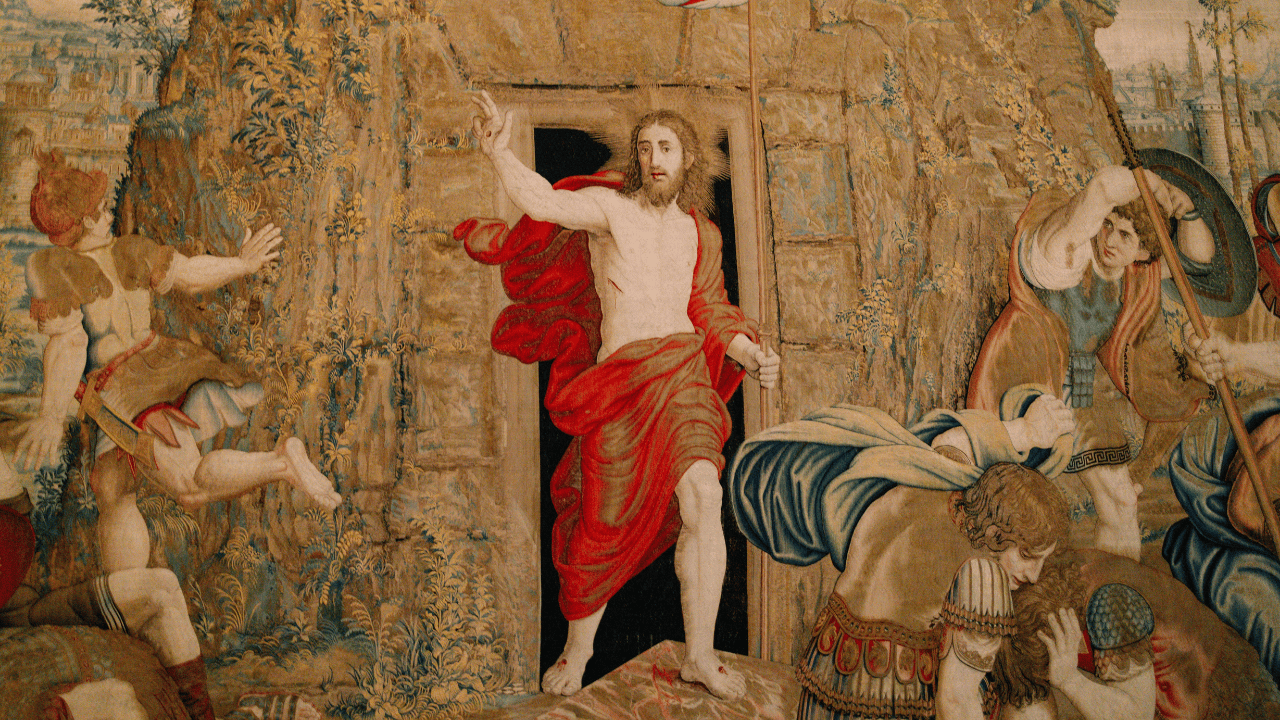
The resurrection is Christianity’s central claim. If it did not happen, as Paul recognizes, “ we are of all people most to be pitied.” Yet to Jesus biographers, Matthew, Mark, Luke and John, there was no doubting the reality of the resurrection. Each paints a different picture of its meaning. To Matthew, the resurrection is the cosmic vindication of Jesus claims of divinity and his place as messiah. Matthew takes aim at Jewish skeptics and rulers. Mark is concerned with the bewilderment and mystery of the empty tomb. Luke is concerned the Jesus connection to fulfilled Old Testament prophesy. John wants us to see the resurrected Lord’s compassion as he interacts with the nascent faith of his troubled disciples. The point of these narratives, and Paul’s commentary later, is that the resurrection is profound and its scope perhaps beyond our immediate comprehension.

